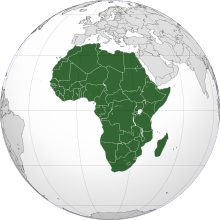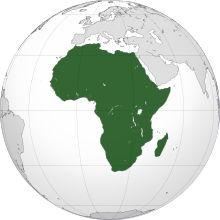 Global Information
Global InformationAfrica information
  | |
| Area | 30,370,000 km2 (11,730,000 sq mi) (2nd) |
|---|---|
| Population | 1,393,676,444[1][2] (2021; 2nd) |
| Population density | 46.1/km2 (119.4/sq mi) (2021) |
| GDP (PPP) | $8.05 trillion (2022 est; 4th)[3] |
| GDP (nominal) | $2.96 trillion (2022 est; 5th)[4] |
| GDP per capita | $2,180 (Nominal; 2022 est; 6th)[5] |
| Religions |
|
| Demonym | African |
| Countries | 54 recognized states, 2 partially recognized states, 4 dependent territories |
| Dependencies | External (4)
Internal (6+1 disputed)
|
| Languages | 1250–3000 native languages |
| Time zones | UTC-1 to UTC+4 |
| Largest cities | Largest urban areas:
|

Africa is the world's second-largest and second-most populous continent after Asia. At about 30.3 million km2 (11.7 million square miles) including adjacent islands, it covers 20% of Earth's land area and 6% of its total surface area.[7] With 1.4 billion people[1][2] as of 2021, it accounts for about 18% of the world's human population. Africa's population is the youngest amongst all the continents;[8][9] the median age in 2012 was 19.7, when the worldwide median age was 30.4.[10] Despite a wide range of natural resources, Africa is the least wealthy continent per capita and second-least wealthy by total wealth, ahead of Oceania. Scholars have attributed this to different factors including geography, climate, tribalism,[11] colonialism, the Cold War,[12][13] neocolonialism, lack of democracy, and corruption.[11] Despite this low concentration of wealth, recent economic expansion and the large and young population make Africa an important economic market in the broader global context.
The continent is surrounded by the Mediterranean Sea to the north, the Isthmus of Suez and the Red Sea to the northeast, the Indian Ocean to the southeast and the Atlantic Ocean to the west. The continent includes Madagascar and various archipelagos. It contains 54 fully recognised sovereign states, eight cities and islands that are part of non-African states, and two de facto independent states with limited or no recognition. This count does not include Malta and Sicily, which are geologically part of the African continent. Algeria is Africa's largest country by area, and Nigeria is its largest by population. African nations cooperate through the establishment of the African Union, which is headquartered in Addis Ababa.
Africa straddles the equator and the prime meridian. It is the only continent to stretch from the northern temperate to the southern temperate zones.[14] The majority of the continent and its countries are in the Northern Hemisphere, with a substantial portion and a number of countries in the Southern Hemisphere. Most of the continent lies in the tropics, except for a large part of Western Sahara, Algeria, Libya and Egypt, the northern tip of Mauritania, and the entire territories of Morocco, Ceuta, Melilla, and Tunisia which in turn are located above the tropic of Cancer, in the northern temperate zone. In the other extreme of the continent, southern Namibia, southern Botswana, great parts of South Africa, the entire territories of Lesotho and Eswatini and the southern tips of Mozambique and Madagascar are located below the tropic of Capricorn, in the southern temperate zone.
Africa is highly biodiverse;[15] it is the continent with the largest number of megafauna species, as it was least affected by the extinction of the Pleistocene megafauna. However, Africa also is heavily affected by a wide range of environmental issues, including desertification, deforestation, water scarcity and pollution. These entrenched environmental concerns are expected to worsen as climate change impacts Africa. The UN Intergovernmental Panel on Climate Change has identified Africa as the continent most vulnerable to climate change.[16][17]
The history of Africa is long, complex, and has often been under-appreciated by the global historical community.[18] Africa, particularly Eastern Africa, is widely accepted as the place of origin of humans and the Hominidae clade (great apes). The earliest hominids and their ancestors have been dated to around 7 million years ago, including Sahelanthropus tchadensis, Australopithecus africanus, A. afarensis, Homo erectus, H. habilis and H. ergaster—the earliest Homo sapiens (modern human) remains, found in Ethiopia, South Africa, and Morocco, date to circa 233,000, 259,000, and 300,000 years ago, respectively, and Homo sapiens is believed to have originated in Africa around 350,000–260,000 years ago.[a] Africa is also considered by anthropologists to be the most genetically diverse continent as a result of being the longest inhabited.[25][26][27]
Early human civilizations, such as Ancient Egypt and Carthage emerged in North Africa. Following a subsequent long and complex history of civilizations, migration and trade, Africa hosts a large diversity of ethnicities, cultures and languages. The last 400 years have witnessed an increasing European influence on the continent. Starting in the 16th century, this was driven by trade, including the Trans-Atlantic slave trade, which created large African diaspora populations in the Americas. From the late 19th century to the early 20th century, European nations colonized almost all of Africa, reaching a point when only Ethiopia and Liberia were independent polities.[28] Most present states in Africa emerged from a process of decolonisation following World War II.
- ^ a b "World Population Prospects 2022". United Nations Department of Economic and Social Affairs, Population Division. Retrieved 17 July 2022.
- ^ a b "World Population Prospects 2022: Demographic indicators by region, subregion and country, annually for 1950-2100" (XSLX) ("Total Population, as of 1 July (thousands)"). United Nations Department of Economic and Social Affairs, Population Division. Retrieved 17 July 2022.
- ^ "GDP PPP, current prices". International Monetary Fund. 2022. Archived from the original on 22 January 2021. Retrieved 16 January 2022.
- ^ "GDP Nominal, current prices". International Monetary Fund. 2022. Archived from the original on 25 February 2017. Retrieved 16 January 2022.
- ^ "Nominal GDP per capita". International Monetary Fund. 2022. Archived from the original on 11 January 2020. Retrieved 16 January 2022.
- ^ "Gordon Conwell Theological Seminary, African Christianity, 2020". 18 March 2020. Archived from the original on 3 May 2021. Retrieved 1 July 2021.
- ^ Sayre, April Pulley (1999), Africa, Twenty-First Century Books. ISBN 0-7613-1367-2.
- ^ Swanson, Ana (17 August 2015). "5 ways the world will look dramatically different in 2100". The Washington Post. Archived from the original on 26 September 2017. Retrieved 26 September 2017.
- ^ Harry, Njideka U. (11 September 2013). "African Youth, Innovation and the Changing Society". Huffington Post. Archived from the original on 20 September 2013. Retrieved 27 September 2013.
- ^ Janneh, Abdoulie (April 2012). "item, 4 of the provisional agenda – General debate on national experience in population matters: adolescents and youth" (PDF). United Nations Economic Commission for Africa. Archived (PDF) from the original on 10 November 2013. Retrieved 15 December 2015.
- ^ a b Collier, Paul; Gunning, Jan Willem (1 August 1999). "Why Has Africa Grown Slowly?". Journal of Economic Perspectives. 13 (3): 3–22. doi:10.1257/jep.13.3.3.
- ^ Alemazung, Joy Asongazoh (1 September 2010). "Post-colonial colonialism: an analysis of international factors and actors marring African socio-economic and political development" (PDF). Journal of Pan African Studies. 3 (10): 62–85. S2CID 140806396. Gale A306596751. Archived (PDF) from the original on 27 November 2021. Retrieved 24 October 2021.
- ^ Bayeh, Endalcachew (February 2015). "The political and economic legacy of colonialism in the post-independence African states". International Journal in Commerce, IT & Social Sciences. 2 (2): 89–93. doi:10.4000/poldev.78. S2CID 198939744. Archived from the original on 17 November 2021. Retrieved 24 October 2021.
- ^ "Africa. General info". Visual Geography. Archived from the original on 24 April 2011. Retrieved 24 November 2007.
- ^ Studies, the Africa Center for Strategic. "African Biodiversity Loss Raises Risk to Human Security". Africa Center for Strategic Studies. Retrieved 12 July 2023.
- ^ Schneider, S.H.; et al. (2007). "19.3.3 Regional vulnerabilities". In Parry, M.L.; et al. (eds.). Chapter 19: Assessing Key Vulnerabilities and the Risk from Climate Change. Climate change 2007: impacts, adaptation, and vulnerability: contribution of Working Group II to the fourth assessment report of the Intergovernmental Panel on Climate Change (IPCC). Cambridge University Press (CUP): Cambridge, UK: Print version: CUP. This version: IPCC website. ISBN 978-0-521-88010-7. Archived from the original on 12 March 2013. Retrieved 15 September 2011.
- ^ Niang, I., O.C. Ruppel, M.A. Abdrabo, A. Essel, C. Lennard, J. Padgham, and P. Urquhart, "2014: Africa". In: Climate Change 2014: Impacts, Adaptation, and Vulnerability. Part B: Regional Aspects. Contribution of Working Group II to the Fifth Assessment Report of the Intergovernmental Panel on Climate Change [Barros, V.R., C.B. Field, D.J. Dokken et al. (eds.)]. Cambridge University Press, Cambridge, and New York, pp. 1199–1265. https://www.ipcc.ch/site/assets/uploads/2018/02/WGIIAR5-Chap22_FINAL.pdf Archived 19 June 2020 at the Wayback Machine
- ^ "One of Africa's best kept secrets – its history". BBC News. 1 July 2017. Archived from the original on 29 July 2021. Retrieved 29 July 2021.
- ^ "Homo sapiens: University of Utah News Release: 16 February 2005". Archived from the original on 24 October 2007.
- ^ Schlebusch, Carina M; Malmström, Helena; Günther, Torsten; Sjödin, Per; Coutinho, Alexandra; Edlund, Hanna; Munters, Arielle R; Vicente, Mário; Steyn, Maryna; Soodyall, Himla; Lombard, Marlize; Jakobsson, Mattias (2017). "Southern African ancient genomes estimate modern human divergence to 350,000 to 260,000 years ago". Science. 358 (6363): 652–655. Bibcode:2017Sci...358..652S. doi:10.1126/science.aao6266. PMID 28971970.
- ^ Sample, Ian (7 June 2017). "Oldest Homo sapiens bones ever found shake foundations of the human story". The Guardian. Archived from the original on 31 October 2019. Retrieved 7 June 2017.
- ^ Zimmer, Carl (10 September 2019). "Scientists Find the Skull of Humanity's Ancestor – on a Computer – By comparing fossils and CT scans, researchers say they have reconstructed the skull of the last common forebear of modern humans". The New York Times. Archived from the original on 31 December 2019. Retrieved 10 September 2019.
- ^ Mounier, Aurélien; Lahr, Marta (2019). "Deciphering African late middle Pleistocene hominin diversity and the origin of our species". Nature Communications. 10 (1): 3406. Bibcode:2019NatCo..10.3406M. doi:10.1038/s41467-019-11213-w. PMC 6736881. PMID 31506422.
- ^ Vidal, Celine M.; Lane, Christine S.; Asfawrossen, Asrat; et al. (January 2022). "Age of the oldest known Homo sapiens from eastern Africa". Nature. 601 (7894): 579–583. Bibcode:2022Natur.601..579V. doi:10.1038/s41586-021-04275-8. PMC 8791829. PMID 35022610.
- ^ "The genetic diversity in Africa is greater than in any other region in the world". 19 July 2018. Archived from the original on 24 October 2021. Retrieved 24 October 2021.
- ^ "New study confirms that Africans are the most genetically diverse people on Earth. And it claims to pinpoint our center of origin". Archived from the original on 24 October 2021. Retrieved 24 October 2021.
- ^ "Africa is most genetically diverse continent, DNA study shows". 9 June 2009. Archived from the original on 24 October 2021. Retrieved 24 October 2021.
- ^ The Egba United Government, a government of the Egba people, was legally recognized by the British as independent until being annexed into the Colony and Protectorate of Nigeria in 1914: Daly, Samuel Fury Childs (4 May 2019). "From Crime to Coercion: Policing Dissent in Abeokuta, Nigeria, 1900–1940". The Journal of Imperial and Commonwealth History. 47 (3): 474–489. doi:10.1080/03086534.2019.1576833. ISSN 0308-6534. S2CID 159124664. Archived from the original on 7 April 2022. Retrieved 5 July 2022.
Cite error: There are <ref group=lower-alpha> tags or {{efn}} templates on this page, but the references will not show without a {{reflist|group=lower-alpha}} template or {{notelist}} template (see the help page).